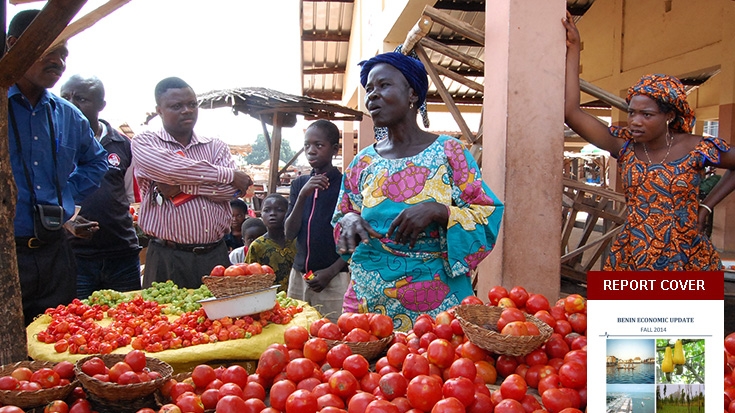According to the findings of this inaugural report, Benin has made substantial progress over the past decade to increase its economic stability and pave the way for rapid GDP growth. After averaging less than 3.7% between 2007 and 2011, the economic growth rate rose to 5.4% in 2012 and 5.6% in 2013. It is projected to continue at a robust rate of 5.5% in 2014. This impressive rebound is in part due to increased efficiency of the port of Cotonou, a key regional trade hub which has helped boost trade and cut shipping costs. In addition, favorable weather conditions and new measures adopted by the Beninese government have contributed to a rise in cotton and crop production.
However, the report reveals that this notable economic growth has failed to significantly reduce poverty levels, owing to unequal income distribution coupled with rapid population growth. “Despite slight improvements in the living conditions of the poorest households, including a reduction in extreme poverty, recent growth has had a negligible impact on poverty rates,” states Boulel Touré, World Bank Senior Economist and co-author of the report.
Citing the poverty trend analysis conducted by the National Institute of Statistics and Economic Analysis (INSAE) in 2014, the report found that the percentage of Beninese citizens living below the national poverty line only fell slightly from 37.5% in 2006 to 36.2% in 2011. Despite this marginal improvement, the poverty rate, using the international standard of $1.25 per day, currently stands at 50.9%. Only asset-based poverty, or poverty calculated on the possession of capital goods, has posted a steady decline.
The report references modest per capita income growth as the main reason why macroeconomic growth has had a low impact on poverty reduction. It also notes that the highly informal nature of the economy, its low productivity - particularly in the agricultural sector, and its lack of diversification all contribute to the persistence of poverty. “Strengthening the link between growth and poverty reduction will require an increase in productivity, an improved business and investment climate, and an expansion of the formal sector,” concluded David Cal MacWilliam, World Bank Senior Economist and co-author of the report.
This new initiative on behalf of the World Bank office in Benin has been very well received. “This report provides the Government of Benin as well as technical and financial partners with substantive analysis for a more sustained dialogue on economic and development policies in Benin,” says Mohamed Gado of the Economic and Financial Programs Unit in the Ministry of Economy, Finance, and Denationalization Programs.
The next issue of the Benin Economic Update is scheduled for Spring 2015.
